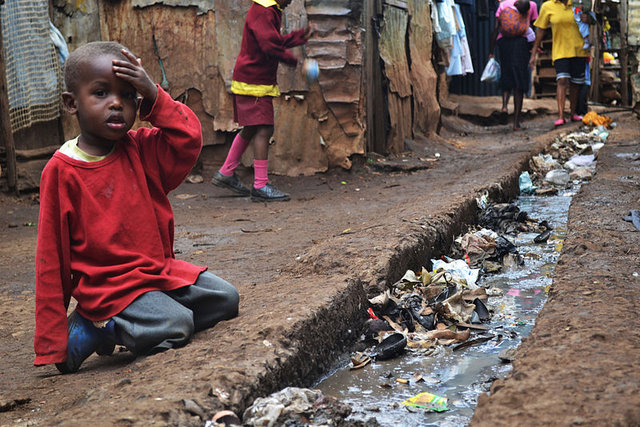“Ignore IMF Reform Package and Stop Repaying Debts”, says Kenyan Peasants League

This article originally appeared on CADTM on 19 August.
The IMF has been peddling a reform package which include repealing the interest rate cap law to remove the power of capping interest rates from Central Bank of Kenya (CBK) to the market, reducing public spending, slapping a 16% Value Added Tax (VAT) on petroleum products as stipulated in the VAT Act 2013 and freezing all government projects as preconditions for Kenya to continue accessing credit claiming that such reforms were essential in reducing the budget deficit and to control the increasing Kenyan debt that is becoming unsustainable.
Early this year, the IMF announced that it had in mid-2017, suspended Kenya’s access to foreign exchange insurance to stabilize the Kenyan Shilling due to the failure of Kenya to reduce the budget deficit however in March, the IMF accepted to extend forex insurance for a further six months after Kenya agreed to repeal the interest rate cap law.
For the past two weeks, the IMF team has been in Kenya to review the progress of implementation of the reform package ahead of the September 2018 expiry of the extension to establish whether Kenya was on course with the implementation of the IMF reforms. In 2013, Kenya enacted the VAT Act 2013 that for the first time in the history of Kenya introduced a 16% VAT on petroleum product. While signing the VAT Act 2013 into law, the government announced a three years grace period referring the implementation of the 16% VAT on petroleum products to 2016 but further extended the implementation to September 2018. IMF now wants this to be implemented in full among other provisions in the reform package for Kenya to continue accessing credit.
With a freeze on government spending on development projects already in place affecting government ability to provide basic services like water, healthcare, education, affordable food and social security, a further imposition of the 16% VAT on petroleum products will affect the ordinary citizens as it will mean an increase in prices of basic commodities whose production is depended on petroleum products effectively making ordinary Kenyans to spend more to access basic commodities thereby affecting their human rights and going against the article 43 of the Constitution of Kenya 2010 that obligates the government to provide every Kenyan with quality education, healthcare, clean water, affordable food and social security.
The KPL believes that IMF is pushing the reforms package as part of the global financial systems, financialization strategy, whose intention is to benefit Kenyan creditors to continue earning from Kenya’s servicing of the debts at the expense of the well being of Kenyan people. It is aimed at making the Kenyan creditors earn more profit and to grow and increase in size and influence over the Kenyan people and institutions regardless of the adverse human rights abuses that such mechanisms will do to the Kenyan citizens.
Fully aware that the Kenyan Debt to GDP ratio now stands at almost 60% of the GDP and that Kenyan government cannot service the debts without affecting her ability to fulfill her constitutional obligations to provide basic services to Kenyans, the IMF prescriptions to Kenya are aimed at maintaining the servicing of debts to benefit the Kenyan creditors but at the same time make the Kenyan government bridge the deficit created debt servicing of increasing unsustainable Kenyan debt by increasing taxes and interest rates.
The IMF-World Bank Annual Meeting is slated to take place in Bali, Indonesia from 8-14 October 2018. La Via Campesina calls upon its members and allies to mobilize in large numbers. Read More
The Kenyan government must suspend the repayment of debts until such a time that is morally, humanly and culturally agreeable, through the participation of the Kenyan people. Kenya should also ignore the IMF reforms package and stop repaying the illegal, illegitimate, odious and unsustainable debts that is owed to shadowy creditors and that were incurred under conditions that violated established Kenyan legal and constitutional procedures in the Public Finance Management Act and article 201 of the Constitution of Kenya 2010, that included policy prescriptions violating Kenyan laws and human rights standards, that are unacceptable and the that lenders issued with an intention of denying the Kenyan people their fundamental civil, political, social and cultural rights and that cannot be serviced without affecting the ability or capacity of the Kenyan government to fulfill its basic human rights obligations, such as those relating to healthcare, education, water and sanitation and adequate housing.
KPL is instead asking the Kenyan government to focus on adopting sustainable means of food production that promotes climate justice and are not fossil fuel intensive and is driven by provision of livelihoods to the millions of Kenyans that are on risk of being driven to poverty by market driven IMF prescriptions.
Kenyan needs to adopt agro-ecology which is a way of life and food production that treats the Earth with respect and care, not as a resource but understands that there is an intimate relationship between humans and their ecology that cannot be reduced to a single value in monetary terms.
KPL is calling upon Kenyans to rise up against the global debt system that is a neo-colonial tool used by the global financial systems to undermine the sovereignty of Kenya as a nation, grab our resources, control our food production system and should demand that the Kenyan Government repudiate the illegal, illegitimate and odious debt owed to shadowy creditors and have become unsustainable.
by
David Calleb Otieno Land & Environment Scientist, Economist and Social Science Researcher, Policy Chief of the Kenyan Peasants League (KPL).
